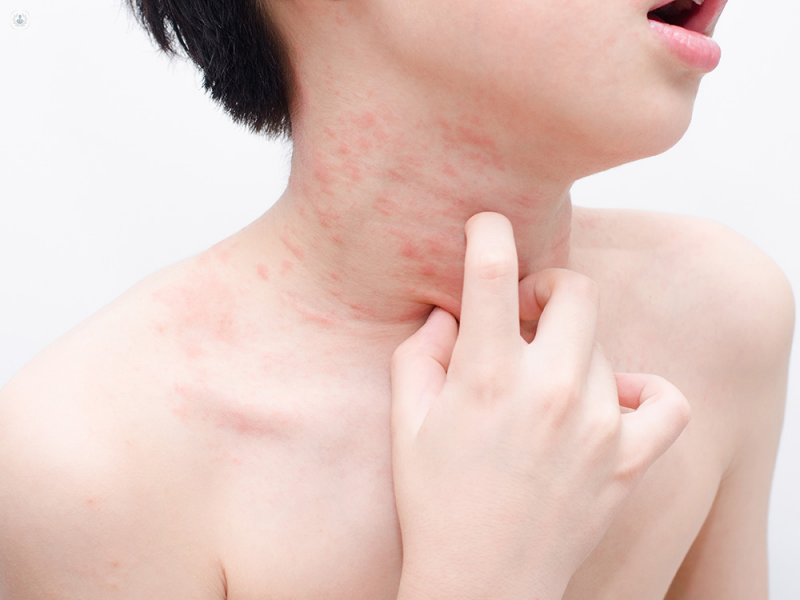Cow’s milk allergy in infants: are the current guidelines causing an overdiagnosis?
Written by:Many children may have been misdiagnosed with a cow’s milk allergy due to the current medical guidelines.
According to new research conducted by Imperial College London and Sechenov University in Moscow, up to 14% of families believe their child has an allergy to cow’s milk; however, when you look at a recent European birth cohort study of over 12,000 infants across 9 countries, less than 1% of children under the age of 2 years actually suffer from milk allergy. So what is causing this overdiagnosis? Dr Robert Boyle, one of our top allergy specialists and the lead author of the research from Imperial’s National Heart and Lung Institute suggests that the current guidelines may be to blame.

What do the current guidelines for cow’s milk allergy suggest?
Researchers analysed official guidelines for cow’s milk allergy published in 9, predominately European countries from 2000 to 2018 and found that many listed general symptoms such as excessive crying, regurgitating milk and loose stools as an indication of an allergy to cow’s milk.
Furthermore, the analysis noted that the prescription of specialist formulas for babies with cow’s milk allergies had increased significantly during the period when these guidelines were published. In England, doctors prescribe about 10 times more of these specialist formulas than would be expected based on the proportion of families who use formula milk and the proportion of infants who have a milk allergy.
Another controversial area in the study found that 7 out of the 9 guidelines advise breastfeeding women to cut out all dairy in their diets if their child displays the above symptoms and they believe they have a milk allergy. Additional studies were then carried out by the researchers that showed that less than one-millionth of the protein from cow’s milk ends up travelling through to breast milk - a tiny amount that is too small to trigger any kind of reaction in most children with a milk allergy.
So, what are the symptoms of milk allergies in children?
There are two distinct types of cow’s milk allergies in children: IgE mediated and non-IgE mediated, and they each display different symptoms after a child has been given food or drink containing cow’s milk:
- IgE mediated — the reaction to milk in this type of allergy occurs soon after exposure to milk, and common symptoms include vomiting or hives. This type of milk allergy is usually quite easy to spot and often occurs within an hour of an infant’s first exposure to milk e.g. as natural yoghurt, formula milk or as an ingredient in baby cereal.
- Non-IgE mediated — this is less common and occurs more slowly. Symptoms of this type of allergy include vomiting, diarrhoea or a flare of eczema.
Symptoms such as regurgitating milk, crying and rashes, which are very common in otherwise healthy babies, are not usually associated with milk allergy, especially in infants not being given milk in their diet, such as exclusively breastfed infants. Infants with severe symptoms, who are receiving lots of cow’s milk in their diet, for example as formula milk, may sometimes be advised to try low allergy milk to see whether symptoms improve – but these symptoms are all much more common than milk allergy, so only a minority of infants will see any benefit.
Why are some of the guidelines promoting inaccurate information?
During the analysis, the team found that 3 of the 9 guidelines were directly supported by companies that make formula or by their marketing consultants. In addition to this, 81% of the authors that wrote the guidelines reported that they had a conflict of interest with formula manufacturers.
These findings suggest that formula manufacturers may be influencing the guidelines so that they can profit from the increased cow’s milk allergy diagnosis. It appears from this study that they are possibly trying to influence practitioners and parents to use a specialised formula instead of a cheaper formula, and by potentially undermining women’s confidence in breastfeeding, which could result in mothers replacing their breastmilk with a specialised formula.
Take-away
Having a child with a suspected milk allergy can be a stressful time for a family, and misdiagnosing a milk allergy may lead to other conditions with similar symptoms being missed or breast-feeding mothers unnecessarily following restricted diets or stopping breast-feeding altogether! It can also result in families and the NHS unnecessarily paying for expensive specialist formula. On the other hand, feeding cow’s milk-based products to an infant with a milk allergy can make them unwell, especially if continued for a prolonged period.
We must not only critically appraise our current guidelines and separate the guidelines from those who might profit from them, but also make sure we are providing each family with the best possible care by avoiding overdiagnosis of cow’s milk allergies.
If your child is displaying symptoms such as vomiting, diarrhoea or excessive crying, it is unlikely that cow’s milk allergy is the main cause. However, if your child is receiving cow’s milk formula and has troublesome symptoms then milk allergy is a possibility and a delay in diagnosis can prolong the issue. If you suspect something, you should make an appointment with a paediatric allergist or paediatric allergy dietitian to get advice or testing. Ideally, you should seek advice from someone who does not take personal fees from the infant formula industry, since financial conflicts of interest can be associated with excessive use of relevant healthcare products.
To make an appointment with Dr Robert Boyle, visit his Top Doctors profile and check his availability.


